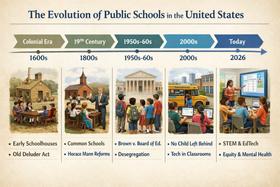Bergman High School is a comprehensive public high school in Bergman, Arkansas, United States. Established in 1930, Bergman High School supports the communities of Bergman, Zinc and nearby unincorporated communities in Boone County and the only high school administered by the Bergman School District.
Serving 276 students in grades 9-12, Bergman High School ranks in the top 30% of all schools in Arkansas for overall test scores (math proficiency is top 50%, and reading proficiency is top 50%).
The percentage of students achieving proficiency in math is 35-39% (which is approximately equal to the Arkansas state average of 39%). The percentage of students achieving proficiency in reading/language arts is 55-59% (which is higher than the Arkansas state average of 40%).
The student-teacher ratio of 5:1 is lower than the Arkansas state level of 13:1.
Minority enrollment is 8% of the student body (majority Hispanic), which is lower than the Arkansas state average of 42% (majority Black).
Quick Facts (2026)
- Grades: 9-12
- Enrollment: 276 students
- Student-Teacher Ratio: 5:1
- Minority Enrollment: 8%
- Graduation Rate: ≥95% (Top 5% in AR)
- Overall Testing Rank: Top 30%
- Math Proficiency: 35-39% (Top 50%)
- Reading Proficiency: 55-59% (Top 10%)
- Science Proficiency: 40-44% (Top 30%)
- Source: National Center for Education Statistics (NCES), AR Dept. of Education
Top Rankings
Bergman High School ranks among the top 20% of public schools in Arkansas for:
Category
Attribute
Reading/Language Arts Proficiency
Graduation Rate
Student Attention
School Overview
Bergman High School's student population of 276 students has declined by 6% over five school years.
The teacher population of 59 teachers has stayed relatively flat over five school years.
Grades Offered
Grades 9-12
(Supplemental Virtual)
(Supplemental Virtual)
Total Students
276 students
Gender %
Total Classroom Teachers
59 teachers
Colors
Blue, Gold
School Calendar
School Motto
Home of the Panthers
School Rankings
Bergman High School ranks within the top 30% of all 989 schools in Arkansas (based off of combined math and reading proficiency testing data).
The diversity score of Bergman High School is 0.15, which is less than the diversity score at state average of 0.61. The school's diversity has stayed relatively flat over five school years.
Overall Testing Rank
#246 out of 989 schools
(Top 30%)
(Top 30%)
Math Test Scores (% Proficient)
35-39%
39%
Reading/Language Arts Test Scores (% Proficient)
55-59%
40%
Science Test Scores (% Proficient)
40-44%
36%
Student-Teacher Ratio
5:1
13:1
American Indian
2%
n/a
Asian
n/a
2%
Hispanic
6%
15%
Black
n/a
19%
White
92%
58%
Hawaiian
n/a
1%
Two or more races
n/a
5%
All Ethnic Groups
Graduation Rate
≥95%
88%
Participates in the National School Lunch Program (NSLP)
Yes
Eligible for Free Lunch
34%
56%
Eligible for Reduced Lunch
18%
10%
School Statewide Testing
School District Name
Source: National Center for Education Statistics (NCES), AR Dept. of Education
School Notes
- School Mascot: Panther
Frequently Asked Questions
What is Bergman High School's ranking?
Bergman High School is ranked #246 out of 989 schools, which ranks it among the top 30% of public schools in Arkansas.
What schools are Bergman High School often compared to?
Bergman High Schoolis often viewed alongside schools like Harrison High School, Valley Springs High School by visitors of our site.
What percent of students have achieved state testing proficiency in math and reading?
35-39% of students have achieved math proficiency (compared to the 39% AR state average), while 55-59% of students have achieved reading proficiency (compared to the 40% AR state average).
What is the graduation rate of Bergman High School?
The graduation rate of Bergman High School is 95%, which is higher than the Arkansas state average of 88%.
How many students attend Bergman High School?
276 students attend Bergman High School.
What is the racial composition of the student body?
92% of Bergman High School students are White, 6% of students are Hispanic, and 2% of students are American Indian.
What is the student-teacher ratio of Bergman High School?
Bergman High School has a student ration of 5:1, which is lower than the Arkansas state average of 13:1.
What grades does Bergman High School offer ?
Bergman High School offers enrollment in grades 9-12 (Supplemental Virtual).
What school district is Bergman High School part of?
Bergman High School is part of Bergman School District.
School Reviews
Review Bergman High School. Reviews should be a few sentences in length. Please include any comments on:
- Quality of academic programs, teachers, and facilities
- Availability of music, art, sports and other extracurricular activities
Recent Articles

Do We Still Need Libraries in Public Schools in 2026
An updated look at the role of public school libraries in 2026, their impact on literacy, equity, and digital learning, and why they remain essential today.

The History of Public Schools in the United States
Explore the history of public schools in the U.S., from colonial roots to 2026 reforms shaping equity, funding, and classroom innovation.

Special-Program Registration Deadlines Explained
Learn what to know about special-program registration deadlines for magnet, CTE, and dual-enrollment options in public schools.









